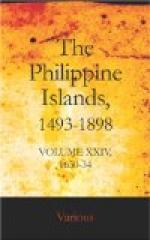[A professed religious of Salamanca, Guevara, after his arrival at Manila, serves in several capacities—as reader in the Manila convent, prior of Santisimo Nombre de Jesus, and prior of Manila. He lives an austere life. While prior of Manila occurs “the rising of the Sangleys, which was ended with so great glory to the Spanish nation. For the Spaniards were so few, while the Chinese were so many that those who assert the smallest number say that they exceeded four thousand. Finally they were killed and destroyed throughout those districts, and their possessions and houses were ruined and burned, a thing regarded as marvelous. For they might have killed the Spaniards with great ease, as the latter were quite unprepared, not expecting any such thing. The city desired to advise his Majesty of the fortunate outcome of the matter; and that in regard to those who have entered Manila through the gates, it has always been extremely fortunate, and has always triumphed over its enemies, but never been conquered. Our father Fray Diego Guevara was chosen, and he accepted very willingly what the city requested, in all having the approbation of our father provincial. It was learned that a galleon was to be despatched from Malaca to India, while it was not the season here for despatches. He took as companion a choir-brother named Fray Diego de Urive, [15] a native of the town of Consuegra in Mancha.” Arrived at Malaca, they find the galleon gone. They go to Goa, thence to Ormuz, and accomplish the journey to Rome overland. “Clemente VIII rejoiced greatly at receiving him, and much more at the good news from the islands of the West.” The general of the order gives Guevara a warm reception, and allows him to depart for Spain. “At that time some differences arose between Ours and the Recollect fathers of our order, who were now commencing to settle. Thereupon an ordinance from Roma ordered an inspection. On petition of the royal Council, the visitation was entrusted to father Fray Martin de Perea, an illustrious member of the province of Castilla, who had been assistant of Espana. Our father Fray Diego de Guevara was chosen as his associate. The father-visitor entrusted to him, because he himself was busy, the visitation of several convents of the discalced fathers, in which he acquitted himself with great discretion. While engaged in the said occupation, Filipinas affairs must have made some stir—and so great, that news thereof came to the royal Council of the Indias. I think that the great devotion of the fathers then in chief authority, did not appear so well to those to whom time had given more license than was fitting. Therefore they wrote imputing to their prelates what it was very fitting should be punished.” The president of the Council, Count de Lemos, after consultation with Father Juan de Castro, of the Augustinian order, secures the necessary papers from Rome and sends Father Guevara to the Philippines with authority to make a general inspection of the order. He sails from Sanlucar, June 22, 1609, taking with him a company of religious, among them Medina. The voyage to New Spain is made without incident.]




